
Introduction
Blockchain & Web3 Services Trusted By Leaders
- Develop innovative solutions using our state-of-the-art blockchain expertise.
- Achieve accelerated growth with robust & scalable Web3 consulting.
- Unlock 360-degree security with our top-rated blockchain development.
Blockchain Implementation in 2024 – Guide 101
Traditionally, the purpose of Blockchain was only to trade digital currency. In the modern world, Blockchain is transformed into a powerful tool that empowers businesses across industries. Businesses are exploring and embracing the capabilities of well-organized processes by implementing blockchain into business, which not only enhances customer experiences but also creates new revenue streams. Furthermore, experts believe that It’s the perfect time for businesses to get this opportunity and saddle the power of blockchain development to stay ahead in an ever-evolving digital landscape. This developer’s guide explores the transformative landscape of blockchain technology, focusing on its impact, and blockchain implementation in businesses. Let’s start;How to Implement Blockchain in Business?
The integration of blockchain technology into business operations represents a paradigm shift, which requires a methodical and technical approach for the successful implementation of blockchain in business. We have broken down the guide into 8 blockchain implementation steps. Using these steps, you can understand what is involved while integrating blockchain into business seamlessly, as well as key considerations that highlight the technical complexities of this transformative process.Steps Involved in Blockchain Implementation
In this section, we will explore each step involved in implementing blockchain technology and navigate its complex terrain, dissecting each phase that shapes the path to a decentralized future.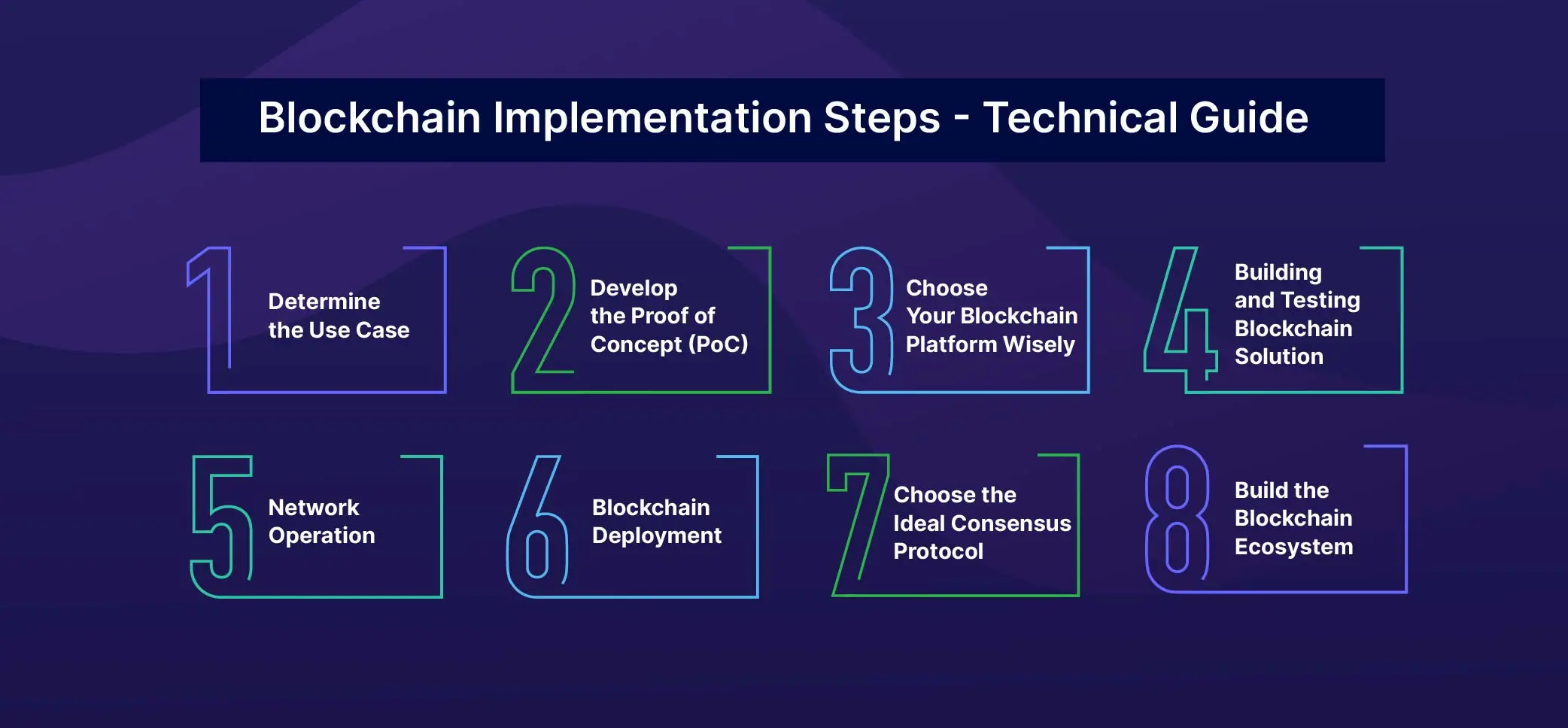
1. Determine the Use Case
Initially, to begin with, businesses must identify potential blockchain use cases while keeping an eye on operational optimization. They should do a thorough examination of effectiveness and intrinsic value follows. Before scaling up, it is necessary to start with a pilot project, subject it to continuous testing, and validate its success.2. Develop the Proof of Concept (PoC)
After getting a validated use case, the next step is to create a solid Proof of Concept (PoC). In addition, this prototype serves as a litmus test, rigorously validating the feasibility and efficacy of the proposed blockchain solution before it is implemented on a large scale. It is essential to understand problem-solving dynamics, the transformative impact on business operations, and the overall benefit derived are all important viability considerations.3. Choose Your Blockchain Platform Wisely
The foundation of this complex process is actually the careful selection of an appropriate blockchain platform or protocol. A thorough understanding of the available platforms is required for optimal utilization. One should perform thorough market research that helps in identifying the best platform, with a budget set aside for strategic decision-making.
4. Building and Testing Blockchain Solution
When it comes to blockchain technology implementation, startups prioritize versatile blockchain technologies that adapt to their specific business needs. Those who do thorough research on existing blockchain options aid them in making sound decisions. The technology’s scope, support for multiple chains and platforms, adaptability to both public and private blockchain networks, and the ability to formulate smart contracts are all important considerations.5. Network Operation
The first step in blockchain implementation is to enter the operational phase, which marks the beginning of the network’s active functionality. Furthermore, the initial block is the foundation of network operation. It contains features that ensure the blockchain’s integrity. The first block includes data validation mechanisms. Moreover, Cryptographic hash functions help to secure data within the block. The first block contains a timestamp, which serves as a chronological reference for transactions. Timestamps are essential for keeping transactions in chronological order. The first block, which establishes the foundation, sets the stage for subsequent blockchain operations. It provides a secure and structured environment for the blockchain’s ongoing operation.6. Blockchain Deployment
The deployment of the carefully assembled network is the final step of implementing a blockchain. This final phase assures seamless functionality, allowing participants to interact with the blockchain in a seamless and secure manner. The installation of a cloud server simplifies the development of hybrid solutions that combine on-chain and off-chain entities.7. Choose the Ideal Consensus Protocol
Firstly, the choice of a consensus protocol for the robust operation of the blockchain is important because it determines how participants collectively validate the authenticity of transactions. In addition, various consensus protocols are available, each with distinct attributes suited for different technical requirements.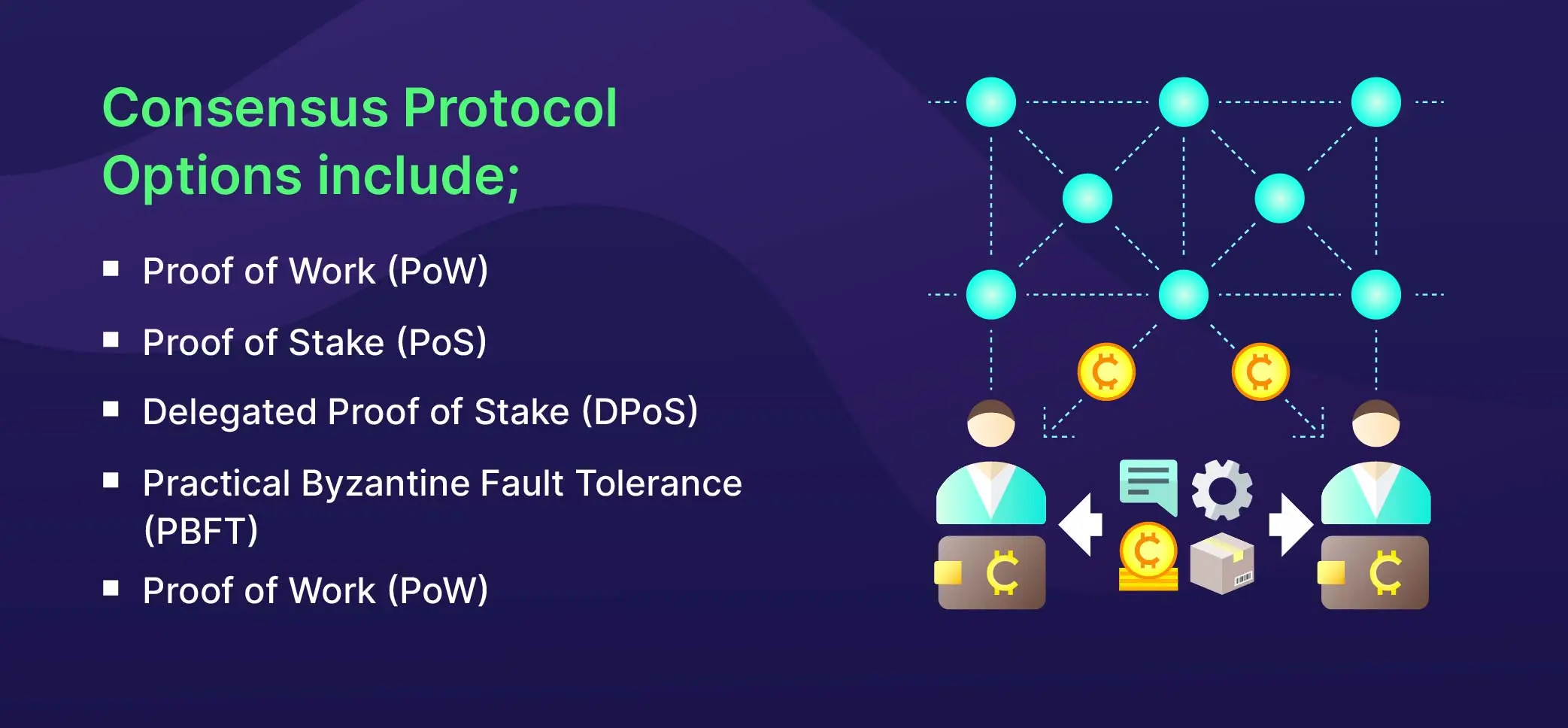
-
Proof of Work (PoW)
Involves miners solving complex mathematical problems to validate transactions. Utilized by Bitcoin for consensus.
-
Proof of Stake (PoS)
Energy efficiency relies on participants staking coins. Validators are chosen based on cryptocurrency holdings. Ethereum transitioning from PoW to PoS.
-
Delegated Proof of Stake (DPoS)
Employs elected validators for faster transaction validation.Introduces democratic voting by coin holders. Utilized by EOS blockchain.
-
Practical Byzantine Fault Tolerance (PBFT)
Suited for permissioned blockchains with known participants. Requires a two-thirds majority for consensus. Integrated into Hyperledger Fabric.
-
Tailoring to Technical Needs
Consensus protocol selection should align with project requirements. Factors include security, energy efficiency, and participant characteristics in the network.
8. Build the Blockchain Ecosystem
As the number of stakeholders increases, establishing a robust ecosystem becomes imperative for deeper understanding and trust. Although, achieving consensus on engagement terms, ensuring fair distribution of costs and rewards, and implementing a governance mechanism are essential in blockchain implementation steps. As a result, these measures promote collaboration and transparency, ultimately leading to the development of a thriving blockchain ecosystem.Key Factors To Consider While Implementing Blockchain?
Businesses must use a technically sound, methodical, and informed approach to navigate the complex landscape of blockchain implementation. Some of the factors are mentioned below;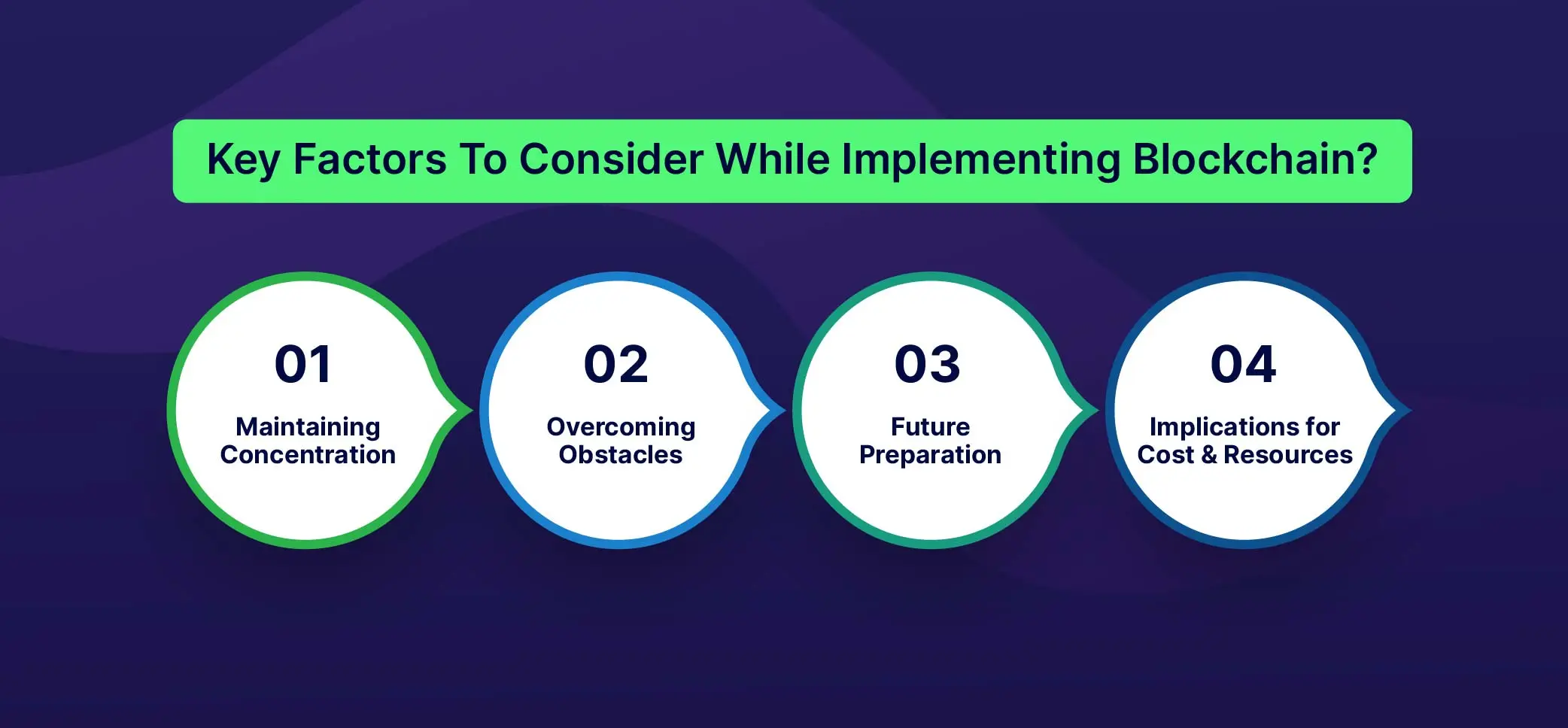
-
Maintaining Concentration
To anticipate protocol edits and changes, the blockchain technology implementation journey necessitates constant adaptation. At different stages of blockchain implementation, distractions are introduced, emphasizing the importance of strategic prioritization. It is really essential for maintaining focus and achieving technical goals during the implementation process.
-
Overcoming Obstacles
The technical learning experience contributes to the successful implementation of blockchain by emphasizing the importance of resilience and adaptability in this difficult journey.
-
Future Preparation
It is essential to plan for the future after developing a protocol. Technical considerations for long-term technical success and sustainability include proper maintenance and support, scalability and performance improvements, regulatory compliance, regular auditing, and an openness to incorporating emerging technologies.
-
Implications for Cost and Resources
It is crucial to understand the specifics of blockchain economics. A long-term monetization strategy and technical considerations include careful cost and resource assessment at each step, maintaining a sustainable approach, optimizing resource allocation, and monitoring market trends for effective technical strategy adjustment.
Challenges in Blockchain Implementation for Seamless Integration
Migrating from a centralized network to a decentralized one has its own challenges. Let’s explore these challenges in detail: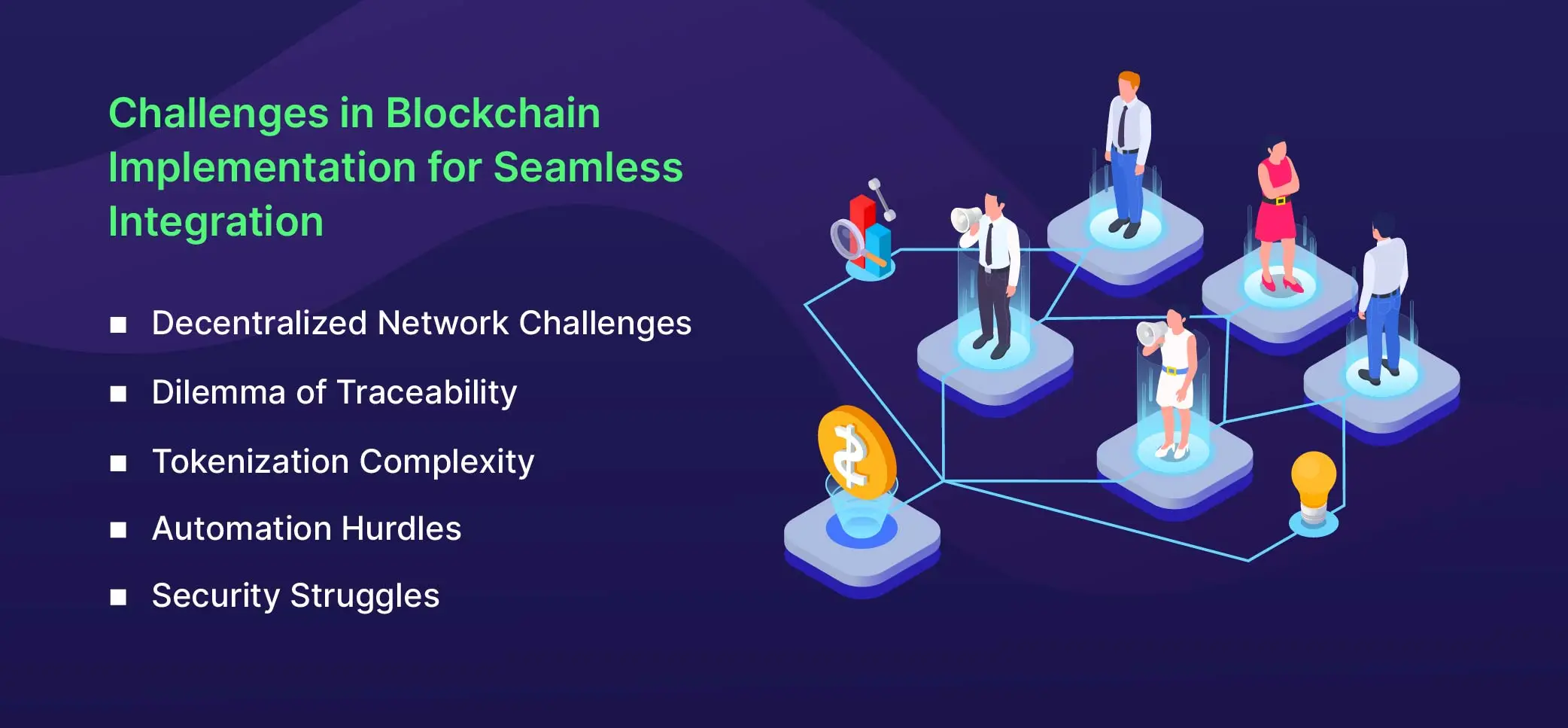
Decentralized Network Challenges
- Transitioning from a centralized business model to a decentralized network involves overcoming ingrained challenges such as inefficiency, single points of failure, and a deficit of transparency and trust.
- Adapting to a decentralized structure eliminates the reliance on central authorities, pushing the way for direct transactions between parties. Apart from the potential for increased efficiency and reduced operational costs, the shift requires a strategic approach to address resistance to change.
Dilemma of Traceability
- Traditional businesses grapple with limited traceability. It hinders real-time updates on ongoing activities. Blockchain, while offering enhanced traceability, introduces challenges related to integration into existing supply chain processes.
- Achieving the promised benefits of supply chain transparency, accountability, compliance with regulations, product quality improvement, and fraud risk mitigation demands meticulous planning to seamlessly incorporate blockchain without disrupting established workflows.
Tokenization Complexity
- Tokenization holds the promise of representing real-world assets as digital tokens, unlocking benefits such as increased liquidity and fractional ownership. However, implementing tokenization in sectors such as real estate presents complex challenges.
- To overcome the challenges of illiquidity, limited investor access, and time-consuming transactions, a nuanced approach is required to ensure the seamless division of real estate assets into tradable tokens while maintaining regulatory compliance.
Automation Hurdles
- The benefits of automation powered by blockchain include process simplification, reduced human intervention, and increased productivity. However, there are unique difficulties in managing the shift from conventional manual workflows to automated blockchain processes.
- A well-planned implementation strategy is necessary to overcome reluctance to change, integrate blockchain and smart contracts seamlessly, and handle any disruptions that may arise during the automation process.
Security Struggles
- One of the main obstacles to the deployment of blockchain technology is the necessity for strong cybersecurity measures in light of the increasing number of data breaches. Although blockchain technology has built-in security features, there are security concerns when incorporating it into current business environments.
- To guarantee a seamless shift while maintaining data integrity, safeguarding against unauthorized access, and addressing possible fraudulent activities, a thorough security plan customized to the unique requirements of the company is required.
- Businesses can realize blockchain’s revolutionary potential while guaranteeing a seamless and safe integration into their operational frameworks by overcoming these obstacles.
Benefits of Implementing Blockchain Technology for Businesses
Businesses can benefit from numerous technological benefits when they implement blockchain technology. This transforms conventional procedures and boosts overall productivity. Let’s discuss the technical details that make blockchain such a powerful force for business transformation as a blockchain development company: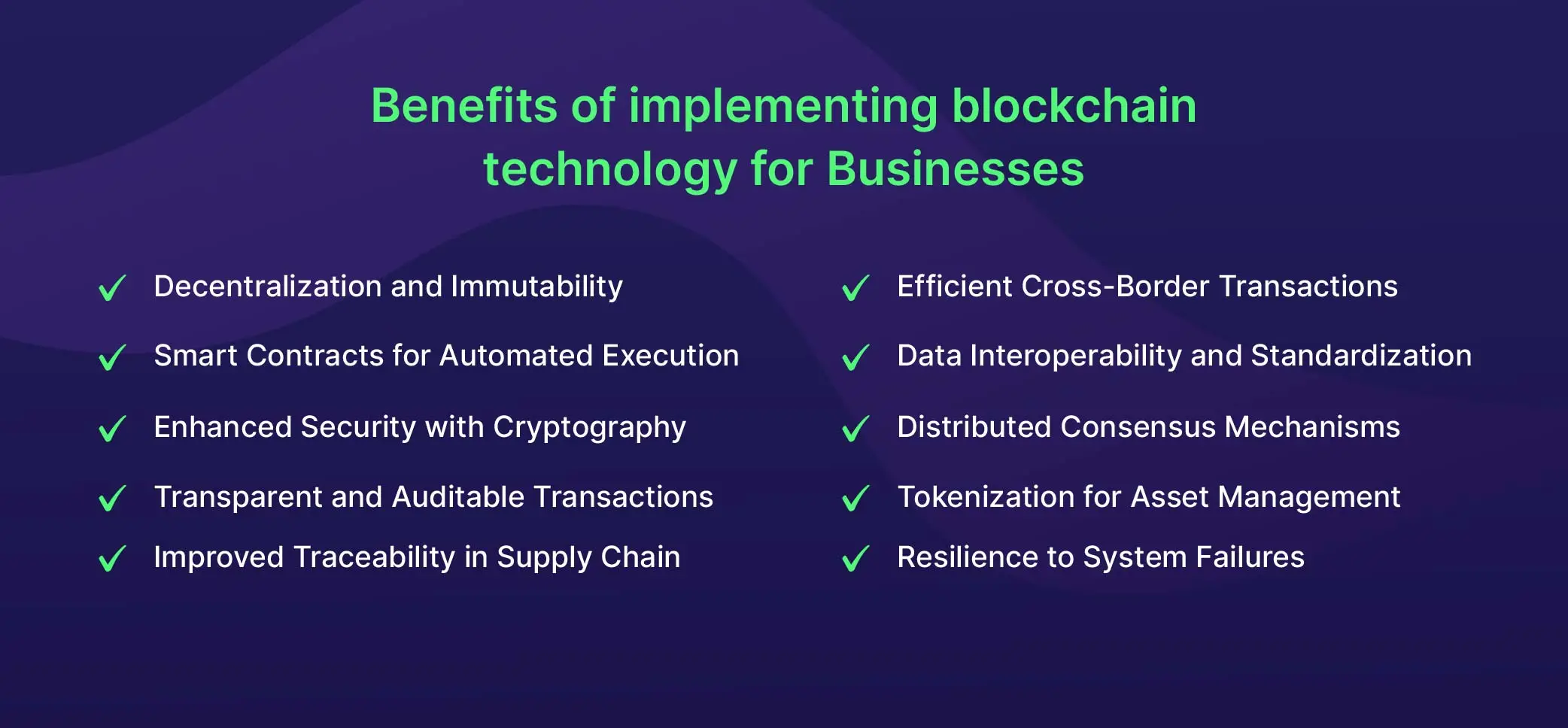
Decentralization and Immutability
- Blockchain eliminates the need for a central authority by operating on a decentralized network of nodes.
- Immutability improves data integrity by guaranteeing that once information is entered into the blockchain, it cannot be changed or tampered with.
Smart Contracts for Automated Execution
- Smart contracts are self-executing automated contracts containing coded terms that enforce business agreements.
- Smart contracts digitally run on the blockchain, ensuring transparency, reducing the risk of fraud, and decreasing the need for mediators.
Enhanced Security with Cryptography
- Transactions are secured by cryptographic techniques, which offer a high degree of confidentiality and integrity.
- Encryption using public and private keys guarantees that data can only be accessed and verified by those who are authorized.
Transparent and Auditable Transactions
- The blockchain records each transaction, resulting in an auditable and transparent ledger.
- This openness lowers the possibility of fraudulent activity and gives interested parties a transaction history that can be independently verified.
Improved Traceability in Supply Chain
- Blockchain records each transaction from production to distribution, allowing for end-to-end supply chain traceability.
- Because it ensures accountability and lessens the impact of recalls, this feature is essential for industries like food and pharmaceuticals.
Efficient Cross-Border Transactions
- Blockchain removes the need for numerous middlemen, enabling cross-border transactions to happen more quickly and affordably.
- Blockchain-based stablecoins and cryptocurrencies simplify international money transfers.
Data Interoperability and Standardization
- Standardized data formats made possible by blockchain enhance system interoperability.
- This standardization improves overall data consistency and minimizes the need for data reconciliation.
Distributed Consensus Mechanisms
- Consensus algorithms such as Proof-of-Work (PoW) or Proof-of-Stake (PoS) validate transactions without relying on a central authority.
- These mechanisms enhance the security and integrity of the blockchain network.
Tokenization for Asset Management
- Tokenizing assets on the blockchain shows ownership that facilitates efficient management of different asset classes.
- This feature opens new avenues for fractional ownership and increased liquidity.
Resilience to System Failures
- Blockchain’s distributed nature ensures resilience against system failures or cyber-attacks.
- Even if some nodes fail, the network remains operational, enhancing the overall robustness of the system.
How Much Does it Cost to Implement Blockchain?
The cost of implementing blockchain is a multifaceted thing to consider. The approximate cost to implement blockchain is $5000 to $50000. Moreso, the blockchain implementation cost encompasses a range of factors, each influencing the overall expenditure. From development and deployment to ongoing operational and maintenance expenses, businesses must navigate various aspects to derive accurate estimations.Factors Influencing Blockchain Implementation Cost
- The complexity of smart contracts and the chosen consensus mechanism significantly impact costs.
- Opting for a public or private blockchain introduces distinct cost structures, with public blockchains incurring network usage fees.
- The development and deployment of custom tokens, along with the intricacy of smart contract logic, contribute to the implementation cost.
- Cryptography and Security Audits: Robust cryptographic implementations and regular security audits are crucial components in mitigating risks but add to the cost.
- Ensuring compliance with legal frameworks necessitates legal consultations and assessments, contributing to overall implementation costs.
- Integrating blockchain with existing systems incurs costs related to data migration, API development, and ensuring interoperability. Ensuring compatibility with industry standards and other blockchain networks influences development complexity and associated costs.
- Implementing solutions for scalability, such as layer 2 solutions or network upgrades, adds to development costs. Future-proofing the blockchain network through planned upgrades incurs additional costs for ongoing maintenance.
- Ensuring continuous operation of network nodes involves monitoring, updates, and addressing potential issues, contributing to operational costs. Establishing and maintaining a governance framework for decision-making within the blockchain network adds ongoing operational expenses.
- Training stakeholders, developers, and users on blockchain technology and its features is a crucial aspect, contributing to the overall implementation cost.
- Building and fostering a community around the blockchain project involves marketing, events, and community management costs.
Why Choose BloxBytes for Blockchain Implementation?
Blockchain technology has become a cornerstone for businesses seeking transformative solutions, and Bloxbytes stands out as a trusted partner for a number of reasons:- BloxBytes offers leading blockchain development services, providing businesses with the expertise to undergo complete transformations through decentralized networks. Also, Bloxbytes plays a great role in being a trusted blockchain development services company, delivering top-notch solutions with years of experience, and ensuring timely delivery and continuous support.
- BloxBytes empowers businesses with a range of blockchain development services, streamlining operations, enhancing security, and unlocking growth opportunities. Furthermore, proficient teams at BloxBytes assist in maximizing business growth through custom blockchain solutions, streamlining operations, enhancing security, and driving innovation.
- BloxBytes pushes forward businesses into the future of digital ownership with NFT marketplace development services, allowing seamless buying, selling, and exploration of unique digital assets.
- If you want to scale your business and need DEX development, BloxBytes can transform the way you trade by creating a secure and efficient decentralized exchange platform. With DEX, you will need a DApp, which we also create to make you thrive in the decentralized era.
- Reshaping business processes with blockchain smart contract development, streamlining transactions, and automating agreements with tailored solutions.
- Experience the future of finance with comprehensive DeFi development services, specializing in innovative solutions for lending, staking, yield farming, and more.
- Maximize business potential with BloxBytes’ blockchain consulting services, collaborating with experts to navigate the evolving landscape and develop a tailored roadmap for success.
- Manage digital assets securely with crypto wallet development services, ensuring ownership and robust security for cryptocurrencies and tokens.